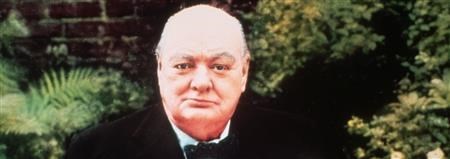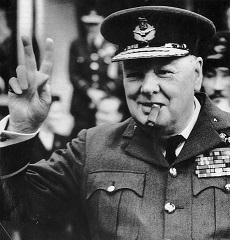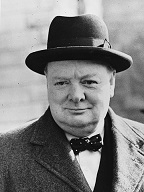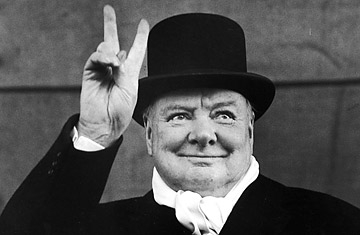 |
| (http://www.biography.com/people/winston-churchill- ()) |
"Continuous effort - not strength or intelligence - is the key to unlocking our potential" ("Winston Churchill."). This wisdom by Winston Churchill encouraged others to stand up and assist in World War II. Churchill was born near Woodstock, England on November 30, 1874 and passed away in London on January 24, 1965 ("Winston Churchill." Contemporary). Churchill had success throughout his childhood, military and political careers. He was known as "an aristocrat who was reviled by many of his peers as a traitor to his class, a career politician who shouldered the blame for one of his country's worst military disasters during World War I and then went on to engineer its victory during World War II--Winston Churchill was an extraordinary man who time and again faced disappointment and adversity with courage, strength, and determination .With the death of one of the last great figures of World War II came a sense that the world itself had changed in some way, that the era of such personally powerful and dynamic leadership had also ended" ("Winston Churchill." Contemporary). He had a profound impact on national and world events during his time and afterward. "Universally acclaimed as one of the greatest statesmen who ever lived, Winston Churchill served Great Britain for over sixty years in various capacities, including prime minister during World War II" ("Winston Churchill." Contemporary). His name is often associated with the victory of World War II because he had such an influence over its outcome, especially after he became prime minister. His notably important characteristics were courage, "mental or moral strength to venture, persevere, and withstand danger, fear, or difficulty;" independence, "freedom from outside control or support;" and perseverance, "continued effort to do or achieve something despite difficulties, failure, or opposition" (Merriam-Webster). Sir Winston Churchill, in the dark times of World War II, lead the United Kingdom and world with courage, using his independent ideas and strong perseverance to guide his country and its allies to victory.
 |
| (http://blog.refactortactical.com/winston-churchill ()) |
Churchill consistently displayed great courage throughout his career, from his early days in the military to the dark days of World War II. In his early military career, Winston went to South Africa to participate in the Boer confrontation: "Churchill headed there as a correspondent and was captured by the Boers not long after his arrival. In December, he managed a dramatic and dangerous escape from the prison camp where he was being held and eventually made his way into neutral territory" ("Winston Churchill." Contemporary). Churchill risked his life to get the story for his job, and he used his intelligence and courage to execute a daring escape. Churchill knew the danger of his correspondence assignment when he accepted the job, but he took it anyways. While a prisoner of war, Churchill knew the risks of trying an escape, but he took a chance and he was successful. Churchill considered all angles when planning his moves to achieve success: "A romantic, he was also a realist, with an exceptional sensitivity to tactical considerations at the same time as he unswervingly adhered to his strategically objectives" (Herbert G., Nicholas). Churchill was an intelligent man, and he possessed the courage to make risky choices and sacrifices to sustain the allies' defensive strategies against the German invasion. In the end, he was one of the main forces that lead to victory for the allies. Churchill had the courage and confidence to place his reputation on the line each day in order to keep the allies working together in harmony. Winston Churchill's consistent and strong leadership is why most people consider him one of the most courageous British citizens of modern times.
 |
| (http://www.fastcompany.com/3024302/if-winston-chur ()) |
Churchill became independent as a child because his parents were not often home, and this helped him create unique and smart tactical choices in his professional career. Churchill's background and childhood provides insight into why he demonstrated extraordinary independent thinking in his career: "Lord Randolph was too busy with politics. Many thought he might be prime minister someday. Jennie was too busy with clothes, parties, and what she later called 'a whirl of gaieties and excitement.' From the time he was one month old, Winston was cared for by a nanny (nurse)" (Lace, pg. 13-14). As a boy, Churchill grew up without much love and support from his family, and he rapidly gained independence and the ability to fend for himself. This may have led to his strong independent ideas during his military and political careers. Churchill confidently stood by his ideas, even in the face of a majority which disagreed with him: "When Hitler launched his sudden attack on the Soviet Union, Churchill's response was swift and unequivocal. In a broadcast on June 22, 1941, while refusing to 'unsay' any of his earlier criticisms of Communism, he insisted that 'the Russian danger . . . is our danger' and pledged aid to the Russian people. Henceforth, it was his policy to construct a 'grand alliance' incorporating the Soviet Union and the United States. But it took until May 1942 to negotiate a 20-year Anglo-Soviet pact of mutual assistance" (Herbert G., Nicholas). Churchill took bold positions in his time in government and military, and he worked to band nations together to make a strong alliance during the war. While Churchill's childhood may have been somewhat harsh, it provided him with the necessary characteristics of independence and courage, which sustained him and motivated him to make difficult and sometimes unpopular decisions during the dark periods of history.
During his career, Churchill was able to think tactically and make risky decisions for the good of his country and other nations regardless of any criticisms from his adversaries. His choices were sometimes disliked by his peers because they didn't believe in his ideas due to political party difference or beliefs. In the beginning of World War II, high members of the United Kingdom government wanted to compromise with an aggressive Germany: "Churchill, the government's leader as prime minister, refused to listen. 'If this long island history of ours is to end at last,' he told the cabinet, 'let it end only when each one of us lies choking in his own blood upon the ground.' His colleagues stood and cheered" (Lace, pg. 10). When members of the government talk about surrendering to Hitler, Churchill knew nothing productive would come from that so he decided, as head of government, to make a stand against Hitler. Churchill was able to reflect on what the different outcome may be when surrendering to Hitler, and he made the decision to not surrender regardless of what the other government officials thought. Churchill decided to persevere though the war regardless of any limitations set on him by party or class, he was passionate to protect his nation: "As prime minister in time of war, Churchill's independence was a single strength. Although a Conservative, he had never been much of a party man, and his claim to be serving the whole nation was never better supported than during the war. Although he opposed communism and socialism, some of his wartime measures heralded the welfare state Great Britain would become after the war. Loath to grant independence to any part of the British Empire, his vigorous prosecution of the war inevitably strengthened the successful movement of a free India" (Rollyson, Jr...). Churchill persevered because he did not limit himself to the beliefs of a specific party, and he used his personal tactics and ideas to advance regardless of what his party thought of him. This paid off because some of his ideas were seen as genius and helped his country be successful. As prime minister he knew he had to make choices that would benefit his country, even if his party or the opposing party did not agree. This made him morally strong and globally aware. Winston Churchill persevered through difficult times and peer disapproval with his plans to end up being globally famous and a successful military leader that was greatly responsible for the victory of the war.
 |
| (http://content.time.com/time/specials/packages/art ()) |
With courage, independence, and perseverance Sir Winston Churchill was able to lead the United Kingdom and the world to peace during World War II. During his career, he made the hard, independent decisions that would benefit his nation and the world, even in the face of opposition. He sacrificed his reputation for international peace and strived to save his country from Hitler. He led with bravery and intelligence during such a difficult time. Without Churchill the outcome of World War II could have ended very different. With the passing of Winston Churchill came an international mourning, and the great leader will be dearly missed: "In the past few days over 320,000 people have passed by his coffin, queuing over a mile in the bitter cold for a chance to pay their respects" (Dodds, Laurence F). And even fifty years after his death, his influence was still greatly honored: "The state funeral of Winston Churchill, 50 years ago today, was a huge occasion. Representatives of more than 110 nations attended, with crowds estimated at over a million lining the route of its procession, while another 350 million people watched live on television. Nine military bands, 18 military units and a flight of fighter jets took part" (Dodds, Laurence F). Churchill is an inspiration to me because of his heroic actions regardless of the risk to him personally, which demonstrated tremendous courage. He inspires me to consider choices that benefit everyone instead of just me. He was a very courageous man, and we should strive to follow in his footsteps. As Winston Churchill famously noted, continuous effort, not just strength or intelligence, holds the key to unlocking our potential to achieve great things in our own careers, so that like Churchill, we can become heroes in our own time. Works Cited Dodds, Laurence F. "As It Happened: The State Funeral of Winston Churchill, January 30, 1965." The Telegraph. Telegraph Media Group, 30 Jan. 2015. Web. 04 Feb. 2015. Herbert G., Nicholas. "Churchill, Sir Winston." Britannica Biographies (2012): 1. Biography Reference Center. Web. 5 Feb. 2015. Lace, William W. The Importance of Winston Churchill. San Diego, CA: Lucent, 1995. Print. Merriam-Webster. Merriam-Webster, n.d. Web. 11 Feb. 2015. Rollyson, Jr., Carl E., and Jr. Carl E. Rollyson. "Sir Winston Churchill." Great Lives From History: The Twentieth Century(2008): 1. Biography Reference Center. Web. 5 Feb. 2015. "Winston Churchill." BrainyQuote.com. Xplore Inc, 2015. 11 February 2015. "Winston Churchill." Contemporary Heroes and Heroines. Vol. 2. Detroit: Gale, 1992. Biography in Context. Web. 5 Feb. 2015.
Page created on 2/16/2015 12:00:00 AM
Last edited 2/16/2015 12:00:00 AM
